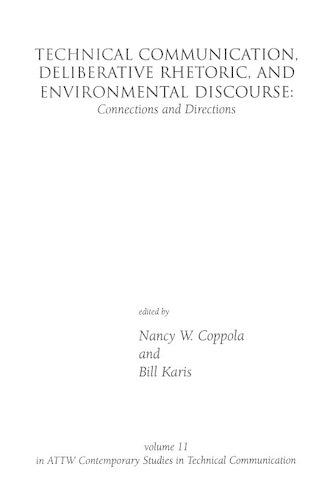
Technical Communication, Deliberative Rhetoric, and Environmental Discourse: Connections and Directions
(Paperback)
Available Formats
Publishing Details
Technical Communication, Deliberative Rhetoric, and Environmental Discourse: Connections and Directions
By (Author) Nancy W. Coppola
Edited by Bill Karis
Bloomsbury Publishing PLC
Praeger Publishers Inc
19th January 2000
United States
Classifications
Tertiary Education
Non Fiction
Semantics, discourse analysis, stylistics
The environment
808.066628
Physical Properties
Paperback
338
Width 156mm, Height 235mm
510g
Description
Academic writing on environmental communication proliferated in the 1990's. A few of us had been calling for such work and making initial investigations throughout the 1980's, but the momentum in the field built slowly. Spurred by coverage in the mass media, academic publishers finally caught the wave of interest. In this exciting new volume, the editors demonstrate more fully than ever before how environmental rhetoric and technical communication go hand in hand. The key link that they and their distinguished group of contributors have discovered is the ancient concern of communication scholars with public deliberation. Environmental issues present technical communicators with some of their greatest challenges, above all, how to make the highly specialized and inscrutably difficult technical information generated by environmental scientists and engineers usable in public decision making. The editors encourage us to accept the challenge of contributing to environmentally conscious decision making by integrating technical knowledge and human values. For technical communicators who accept the challenge of working toward solutions by opening access to crucial information and by engaging in critical thinking on ecological issues, the research and theory offered in this volume provide a strong foundation for future practice.
Reviews
.,."well worth the investment in reading the book. In my next technical writing course, whether basic or advanced, environmental communication will not only be included, but will be dealt with in a way that focuses the central problems and issues of the profession. And readings will include several essays from Coppola and Karis's collection."-Issues in Writing
"Technical Communication, Deliberative Rhetoric, and Enviornmental Discourse is a useful teaching tool for any upper-level rhetoric or composition theory course....[h]elps students realize the many ways technical communication is involved in the world and affects their lives. With a wide variety of articles, the bok demonstrates many different views current in the field of enviornmental writing. It attempts to reach the many different audiences involved in enviornmental writing, trying to help writers of enviornmental discourses realize their potential to ease tension in the conservation dialogue/"-Technical Communication Quarterly
...well worth the investment in reading the book. In my next technical writing course, whether basic or advanced, environmental communication will not only be included, but will be dealt with in a way that focuses the central problems and issues of the profession. And readings will include several essays from Coppola and Karis's collection.-Issues in Writing
All readers who are concerned about the environment effects of technology or who love plants and animals will find their sense of the complexity of the issues deepened....the book is intelligently put together...Including and celebrating so many perspectives and critical approaches, this book is itself an enactment of ideal environmental communication: a productive, caring "dialogic, dynamic discourse of many voices."-Technical Communication
Technical Communication, Deliberative Rhetoric, and Enviornmental Discourse is a useful teaching tool for any upper-level rhetoric or composition theory course....[h]elps students realize the many ways technical communication is involved in the world and affects their lives. With a wide variety of articles, the bok demonstrates many different views current in the field of enviornmental writing. It attempts to reach the many different audiences involved in enviornmental writing, trying to help writers of enviornmental discourses realize their potential to ease tension in the conservation dialogue/-Technical Communication Quarterly
..."well worth the investment in reading the book. In my next technical writing course, whether basic or advanced, environmental communication will not only be included, but will be dealt with in a way that focuses the central problems and issues of the profession. And readings will include several essays from Coppola and Karis's collection."-Issues in Writing
"All readers who are concerned about the environment effects of technology or who love plants and animals will find their sense of the complexity of the issues deepened....the book is intelligently put together...Including and celebrating so many perspectives and critical approaches, this book is itself an enactment of ideal environmental communication: a productive, caring "dialogic, dynamic discourse of many voices.""-Technical Communication
Author Bio
NANCY W. COPPOLA is Assistant Professor of English and Director of the Master of Science program in Professional and Technical Communiation at the New Jersey Institute of Technology. In addition to publishing articles on environmental communication and pedagogy, she is co-author of Environmental Perservation and Pollution Prevention:Science and Humainties Perspectives (1997). BILL KARIS is Associate Professor and Chair of the Department of Technical Communications at Clarkson Univerisity. He has published in Rhetoric Review, Journal of Business and Technical Communications, Journal of Engineering Technology, Technical Communication, IEE Transactions on Professional Communication, and Technical Communication Quarterly, as well as a recent Ablex collection (Sebler,1997). He co-edited, with Jimmie Killingsworth,a special issue of CQ (Winter,1997) focusing on environmental discourse.
